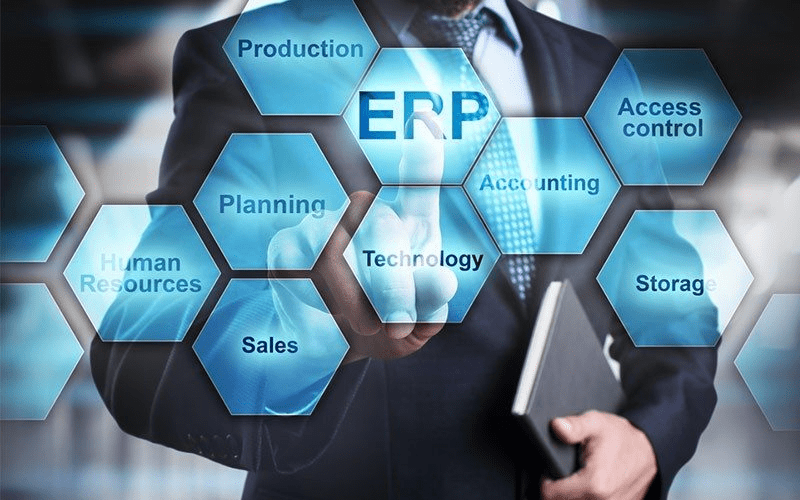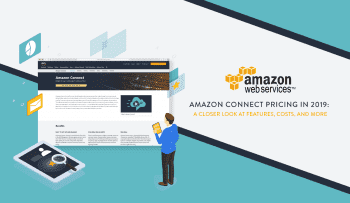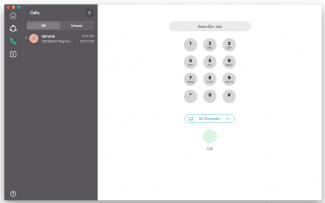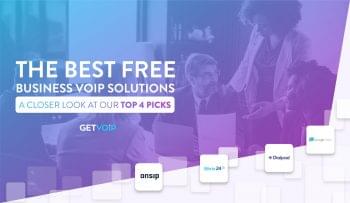Thanks to the increasing popularity of cloud delivered business solutions, even the smallest organizations can gain access to otherwise costly and overwhelming solutions that were previously relegated to only the largest enterprise companies. Cloud computing has transformed these expensive, featured packed solutions from bulky solutions that require onsite hardware and management, into lightweight, easy to use, and affordable business tools.
Along with business VoIP and other solutions, probably the most important tool to transition into a Software as a Service model has been Enterprise Resource Planning applications. In the past, ERP solutions were costly and mostly on-premise, as opposed to a cloud or even hybrid deployment, and required an IT team to manage it all. But the cloud has now made ERP an affordable solution for even the smallest businesses, enabling teams of all sizes to leverage the insight provided by ERP tools, revolutionizing the way businesses operate.
But what is ERP, and does your business really need another cloud subscription looming over its head? We’ll take a close look at what exactly makes up an ERP solution, the benefits it brings, and everything your business needs to know before jumping into the deep end.
What is ERP?
While the name itself may sound a bit self-explanatory, Enterprise Resource Planning, it certainly doesn’t tell the entire story of ERP. To get the basics out of the way: Enterprise Resource Planning solutions combine every single aspect required to run a business into one single, centralized database. This way your business has a handle on every single piece of information that makes up your business processes.
But, to truly understand what an ERP solution is, how it works, and how it will benefit your business, we first need to familiarize ourselves with the different aspects that come together when running a business:
- Financials
- Order processing
- Sales and marketing
- Human resources
- Manufacturing
- Supply chain management
- Customer relationship management
- Business Intelligence
Every piece of information that your business will need to track will be covered by an ERP solution If your business is selling products directly to customers, it’s important to have a tool in place to track all relevant information on each individual sale, a tool to track the manufacturing process of your products, a tool to track marketing efforts, order processing, essentially everything I already listed above.
But instead of attempting to bundle different solutions together, like one app for CRM and another for tracking marketing efforts, your business can utilize an Enterprise Resource Management tool to combine all of these aspects into one single, integrated and seamless platform.
The Key Principles of an ERP Solution
Enterprise Resource Planning solutions of course will work in a number of ways, depending on the specific provider and solution that your business chooses. However, there are a few basic principles that will apply to just about every single ERP solution out there on the market.
1. A Single Centralized Database
Overall, the one major overarching principal of ERP solutions is that they collect data into one centralized database. No matter what your ERP tool is tracking, it will always store information into this centralized database, which is generally accessible by a number of different teams within your business.
The idea is that with all of the information you need at your fingertips, your business can now develop new strategies that leverage this new deep insight. And with all departments utilizing the same central database, you can ensure that the information is consistent across all departments and fields — the database used by sales and marketing will be the exact same database utilized by the financial department.
2. Customize with Modules
Beyond a centralized database, your business gains a great deal of flexibility on how they want to setup their ERP solution. See, ERP applications use different “modules,” which allow your business to customize the solution to fit their direct needs.
One module will cover one specific aspect of business, for example your business’ financials, or sales and marketing efforts. Depending on what your business does, there are different modules that can be included to build out the perfect solution. Modules will generally be sold as individual options, or even as packages for specific industries.
3. Flexibility to Fit Your Needs
Going back to my sales example, if your business is selling products to customers, your ERP modules would include sales, marketing, manufacturing, supply chain management, and customer relationship management. But if your business is in the repair industry, this would require modules like helpdesk ticketing, order processing, and not so much sales or supply chain management.
This provides your business the flexibility to bend the solution to fit your unique needs, allowing your business to make changes on the fly as things develop further. And since these solutions fall under the SaaS umbrella, (not to be confused with UcaaS or CpaaS) you can expect a lightweight application, mobility, flexibility, integrations, and a maintenance free environment. Combine this with the flexibility of modules, and your business can quickly and easily shift focus on the move.
Modules to Look For
So as the core focus of an ERP solution, its important to understand the different modules most commonly included with these tools, and what kind of information they track and display. Sometimes modules will be sold individually, and sometimes you might find them packaged, like Sales and Marketing might come together.
Depending on the provider you choose, your mileage will vary. But, we wanted to take a closer look at some of the most common modules included in ERP tools, and identify the types of information they will track and make available.
- Financials and Accounting
Fairly self explanatory, an accounting module will help your business manage all of its finances and transactions. These modules will generally have an accounts receivable, accounts payable, payroll, and a general ledger for the business. This helps all departments of your business gain a deeper insight into the financial aspects of the business to drive more educated decisions when it comes to spending, or saving.
- Order Processing
For businesses that are handling orders, ERP solutions will help teams gain a deeper insight into the entire order fulfillment process. This module will generally track order entry, credit checking, pricing, inventory, shipping, sales analysis and related reporting. Keep track of the entire process and recognize where improvements could be made.
- Sales and Marketing
If your business is selling products directly to customers, a module that tracks sales and marketing efforts can be huge. Track the entire process including customer inquiries, existing quotes, as well as different orders, invoices, email campaigns, phone campaigns, or any other way your business is reaching out to customers. Not to be confused with a CRM module, but the two work in conjunction.
- Human Resources
Any business with a Human Resources department would benefit greatly from an HR module within their ERP solution. This module will help your business track anything related to recruiting, onboarding, payroll, benefits, retirement, diversity management, severance, as well as personal employee histories, skills and capabilities, as well as salaries.
- Manufacturing
Of course, for any business that deals with the manufacturing of products or goods, its imperative to have a close eye on the entire process. With a manufacturing module, ERP solutions can track and monitor every step of product development including work orders, scheduling, capacity, quality control, materials as well as manage the overall workflow.
- Supply Chain Management
In similar fashion to a manufacturing module, ERP solutions can track and manage every single aspect of the supply chain. Separated into different sub-processes, these modules will track customer presence, order entry and fulfillment, order distribution, customer payments and invoicing, as well as cash applications, deductions, collections, and even product configuration and warehousing.
- Customer Relationship Management
While independent CRM solutions exist, the vast majority of ERP solutions will include a Customer Relationship Management portal to seamlessly integrate every single aspect of your business under one roof. These modules will mostly focus on sales, marketing and customer service. The benefit is the direct integration with the other aspects of your ERP solution, like manufacturing and supply chain, to truly understand every step of the process and provide the best support possible. You can check out our CRM blog to learn more about the relationship between CRM and ERP solutions.
- Project Management
Understand how to best utilize different teams and specialties within your business through project management modules integrated into your ERP solution. Project management tools will allow your business to best identify the teams and departments equipped to handle specific problems or projects, and track the progress along the way to ensure everything is running smoothly. Again, leverage other ERP information for a more educated decision.
Features and Capabilities to Look For
Just like any other cloud application, not every single ERP solution will be made equally. While information might be hard to come by without speaking to a sales representative, there are generally a good number of features that your business will want to look out for when shopping for an ERP solution.
Aside from the modules, of course, these features can help a solution better fit into your business’ specific needs, and are worth considering before even diving deeper into the modules provided and offered with each solution.
- Mobility and Remote Access
Mobility is an absolute key in the modern era of cloud computing. Employees and teams are always on the move, and we now have devices always with us, phones and tablets, that enable users to access their business tools and solutions even when they’re not in the office.
The same should be said for an ERP solution — your employees should be able to access the valuable information provided by this solution even when they are not in the office. Whether through mobile and smart phone applications, or remote access through a laptop or other computer, its important to search for an ERP solution that enables your business to stay informed, even on the go.
- Third Party Integrations
Just like mobility, third party integrations have quickly become a standard for cloud delivered services. Integrations, powered by APIs, allow us to connect otherwise separate solutions and tools, enabling teams to gain even more insight by connecting previously silo’d databases and information. Integrations help fill gaps, as ERP solutions are all about combining information under one roof.
The ability to integrate other tools into your ERP with only bolster the power of these tools. Integrations also help us save time, instead of having to flip from window to window to find the right information, it will all be located directly in the same ERP database.
- Security
As ERP solutions were originally meant for large Enterprise businesses that need to get a handle on their massive amounts of data and information, naturally the solutions were built with the highest security in mind. An ERP solution can go a long way in providing insight your business could have never received before, but if that database is cracked it could mean doom for your business.
Always ensure that any cloud solution, let alone an ERP system, has the best security and encryption, as well as HIPAA compliance, possible to ensure your information stays protected.
- Customization
Almost a guaranteed benefit of ERP solutions is the sheer customization made possible, thanks to the way ERP systems operate. By picking and choosing different modules, your business is able to customize their platform to best for their needs. If your business isn’t manufacturing any goods, then why bother with a manufacturing module?
But going even further, some ERP solutions will even allow your business to customize modules themselves with specific features and capabilities to track and record information in a number of different ways, users can even sometimes customize workflows and leverage automations to simplify their work. The more customization, the more power your business gains over its data.
- Reporting and Dashboards
Of course ERP solutions are designed to display your data in one centralized location, so naturally reports and dashboards would be a given for these platforms. However, that doesn’t necessarily tell the whole story. Some ERP solutions go above and beyond the standard PDF exports and excel spreadsheets to represent data, and instead will utilize advanced reporting tools, generally including visual aids like charts and graphs.
Some solutions make it possible to generate financial statements and reports based on geographical region and location. You want to look for dashboards that provide in-depth insight at different levels including business wide, department wide, or employee specific.
- Social Capabilities
Social media is pretty much a staple of our lives at this point, the majority of us are constantly on at least one or more social media platforms. And this is no different for businesses. Customers and clients are reaching out to social media channels for assistance, and brands should leverage social media not only for support but also marketing.
Social capabilities within an ERP solution will enable your business to database and track any social interactions it might have with clients and customers — this could be on both the marketing or the CRM side of things.Going further, an ERP solution might be able to track metrics like customer engagement including likes, shares, and friend network, brand mentions online, and just about all social interactions with the public.
The Benefits of an ERP Solution
If you haven’t already figured it out by now, there is a pretty sizable list of the benefits that an ERP solution will bring your business. With one centralized location to store and keep track of your business’ massive amounts of data, your entire team can gain a much deeper insight into, well, the entire business.
The information gathered by your ERP can help your business manage departments more effectively, understand and track the entire manufacturing process, recognize where faults might be in the customer service department, or understand how to better optimize different workflows and processes. But, that’s not all. In a nutshell, these are some of the largest benefits that an ERP solution can provide your business.
- Greatly improved business insight and understanding with company wide, real-time, information from generated reports. Cover every single aspect of your company from the moment a customer engages your business, to the moment the product is shipped from your warehouse. Similar to predictive analytics, ERP solutions help your business gain a deep understanding of different business processes, spending and budgeting, and much more, all located in one application.
- Lower your business’ operational costs with this deep company wide insight. Recognize and identify different aspects of your business that could be improved, trimmed down, or simply altered to better maximize profits and reduce costs. Overall, gain a deep understanding into where and how to improve your business with advanced knowledge over every step of the process. One single database also lowers the need for additional training and onboarding onto more than one solution.
- Foster collaboration in, and between, departments. With an ERP solution in place, teams and departments can work together with integrated data locations. Instead of having teams and departments operate independently, ERP solutions enable collaboration by removing these boundaries between teams, enabling them to cross reference and collaborate together.
- Improve business efficiency and productivity not only with one centralized location for all relevant information, but also with the simplicity and ease-of-use that SaaS solutions generally provide. Individual machines no longer require individual licenses, your business no longer requires an IT department to maintain and setup the solution, and one seamless user experience across all departments ensures ease of use and less training required.
- Reduce business risk and improve security with an ERP solution. With all your data locked behind one door, ERP solutions can help keep everything safe and secure as they are generally equipped with firewalls, restriction controls, compliance controls and other regulatory process standards. Most ERP solutions will also provide user permissions, manageable by administrators, to help keep unwanted eyes away from certain data sets or modules. Overall, ERP solutions will be tightly locked and secure, with the tools to ensure only authorized users can access the most sensitive data.
- Empower your business to make accurate predictions and future forecasts. The sheer amount and depth of information collected by an ERP solution will allow your business to shape new strategies, accurate predictions and future forecasts. With in-depth insight into every single aspect and process of your business, decisions can be made with a much stronger idea of how the future might play out.
The Downsides and Pitfalls
Overall, leveraging an ERP system enables your organization to gain a total grasp on all the information and data required to track and manage just about every single aspect of the business. The power of these solutions isn’t something to take for granted, and there’s a reason many, many Enterprise and smaller businesses rely on and take advantage of an ERP solution.
However, that’s not to say that ERP systems are without their own flaws. Just like any cloud solution, there are mistakes that can easily be made. The sheer amount of information collected alone can easily be overwhelming to smaller teams, not to mention how costly these solutions might be, and how long the onboarding process will take. Thankfully cloud delivered solutions help reduce these pain points, but they still exist to a degree.
- Customization either be limited in certain scenarios, like a lack of features within a module or even a lack of specific modules for a specific business process — this would make it difficult to bend the solution to best fit into your business’ needs. On the flip side, too much customization can also be a disadvantage, with smaller teams becoming overwhelmed by the sheer amount of options and modules available. Without a strong grasp on the customization, your business won’t have a strong grasp on the solution and the information it can provide, leading to more headaches and issues.
- Cost can be a major factor that limits ERP accessibility. Even though cloud delivered solutions are available and solutions can generally be custom tailored to fit the needs and budget of your business, the reality is that ERP solutions can be expensive, with solutions starting at the couple thousand-dollar mark, billed annually. If your team is small or limited in scope, the investment might not entirely be worth it.
- Deployment and onboarding can take a very long time, even with cloud delivered solutions. The time it takes for your business to completely integrate the ERP solution, train staff, onboard every department and process, and for employees to become familiar with the solution, could easily outweigh the benefits and initial investment required. Time is money, and sometimes the time spent on a new solution isn’t worth the cost.
- Independent teams and departments that wish to stay mostly independent can overall reduce how effective your business’ ERP solution will be. If teams are hesitant to share information and utilize the ERP solution to track and manage their business process, then there will be a hole in the business’ overall system, leading to more potential issues. Your departments have to want to use the ERP solution for it to truly be effective.
- A potential security nightmare could occur if your business’ ERP solution is not properly protected. With all of your business information and management located under one roof, this adds a lot of convenience, but can also lead to a massive breach if the system is ever attacked. If your solution isn’t kept up to date with the latest patches and updates, is poorly configured and secured, or user permissions are not properly setup, then your ERP solution can be a gateway into your business’ critical information. Heck, even VoIP services can be attacked, so its imperative that your business keeps everything, especially ERP, up-to-date.
The Bottom Line
Previously limited to only the largest Enterprise businesses, ERP solutions have now become much more accessible and affordable for even the smallest SMB teams thanks to the benefit of cloud delivered services. As an SaaS solution, ERP applications are becoming much more flexible and simpler to adopt, while bringing along even new benefits of mobility and flexibility.
At the end of the day, benefits of utilizing an ERP system can drastically outweigh the initial cost and time required to establish a solution, as long as your business takes the proper time to learn the system. ERP solutions simply offer an in-depth look into every single piece of information, and manage every bit of every process of your business, enabling your team to optimize wherever necessary.








